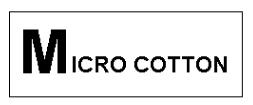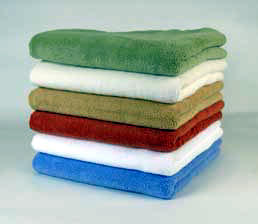TTAB Reverses Genericness Refusal of "MICRO COTTON"
The PTO failed to produce the required "clear evidence" to support its genericness refusal of the mark MICRO COTTON for bath linen, towels, napkins, clothing items, and related goods, in classes 24, 25, and 28. In re Sharadha Terry Prods. Ltd., Serial Nos. 78027603 and 78027605 (September 1, 2005) [not citable].
 Although the Examining Attorney cited Sections 1, 2, and 45 of the Trademark Act (failure to function as a mark), the Board deemed the refusal to be based on genericness, i.e., that MICRO COTTON is "the generic name of the fabric used to make the involved goods." However, the PTO's evidence showed "mixed uses" of the term MICRO COTTON. As pointed out by Applicant, most of the PTO's evidence:
Although the Examining Attorney cited Sections 1, 2, and 45 of the Trademark Act (failure to function as a mark), the Board deemed the refusal to be based on genericness, i.e., that MICRO COTTON is "the generic name of the fabric used to make the involved goods." However, the PTO's evidence showed "mixed uses" of the term MICRO COTTON. As pointed out by Applicant, most of the PTO's evidence:
"either refers to applicant's goods sold under its MICRO COTTON trademark, or shows that the term 'micro cotton' does not exist as an industry term, or the uses of the two words do not relate to the use in the context of these applications, or the uses are misuses of the term."
Observing that that "the overwhelming majority of the evidence does not show generic use of the words 'micro cotton' to refer to a type of fabric," the Board found that the PTO failed to show that MICRO COTTON "is generic for the genus of the type of fabric used to make applicant's involved goods."

Turning to the second prong of the genericness test -- how the relevant purchasers (the general public) would perceive this phrase in relation to Applicant's goods -- the PTO's evidence was "again mixed." (In fact, it was the same evidence). In addition, Applicant submitted "significant evidence in rebuttal -- letters from two professors, a declaration from a customer, Internet search results, and a patent search -- all indicating that MICRO COTTON is not a type of fiber or fabric. Thus the PTO failed to prove that purchasers would perceive MICRO COTTON as the name of the fabric used to make Applicant's goods.
The Board did, however, require that Applicant disclaim the word "cotton," for obvious reasons.
Evidentiary rulings: Before it reached the substance of the case, the Board addressed several evidentiary matters.
First, when Applicant objected to PTO evidence from foreign websites, the Examining Attorney cited In re Remacle, 66 USPQ2d 1222 (TTAB 2002) for the proposition that "web sites deriving from foreign sources should be given the same weight as evidence from U.S. sources because the Internet knows no boundaries." The Board, however, pointed out that Remacle was limited to "particular situations" involving "professionals in medicine, engineering, computers, telecommunications...." Here, however, Applicant's goods are offered to the general public, and consequently Remacle is inapplicable. Therefore, the probative value of the Internet evidence cited by the PTO "is quite limited."
Second, Applicant objected to the PTO's list of Google search results (i.e., a "hit" list), but the Board ruled the list admissible, though of limited probative value: "evidence of use of a term or phrase in headings or content on individual websites has far greater probative value." See In re Fitch IBCA Inc., 65 USPQ2d 1058 (TTAB 2002).
Third, Applicant offered new evidence with its brief: the full text of a NEXIS article that the Examining Attorney had submitted in excerpt form, and additional pages from websites from which the PTO had submitted other pages. Applicant cited In re Bed & Breakfast Registry, 229 USPQ 818, 820 (Fed. Cir. 1986) in support of its position. The Board agreed with Applicant with regard to the NEXIS article, but declined to "extend" Bed & Breakfast to web pages because, unlike NEXIS articles, websites are "transitory" (i.e., "Internet websites may be modified or deleted at any time").
Text Copyright John L. Welch 2005




0 Comments:
Post a Comment
<< Home